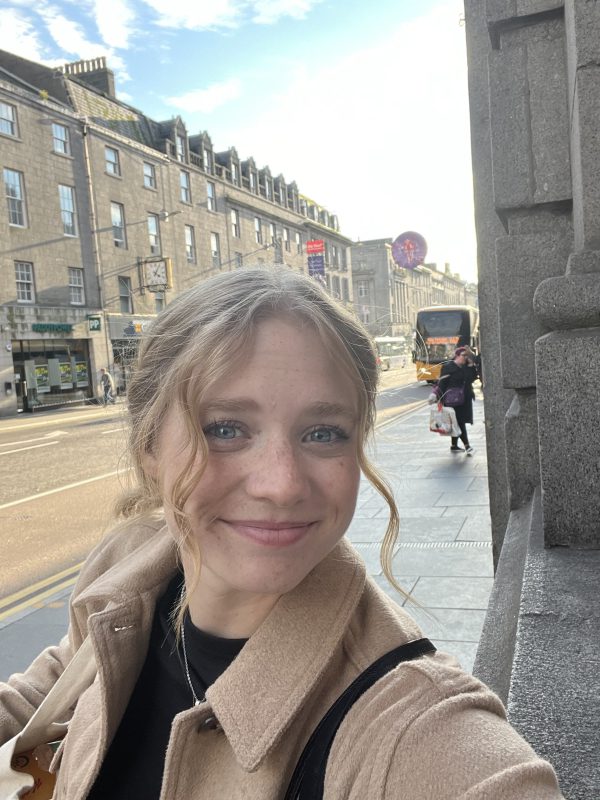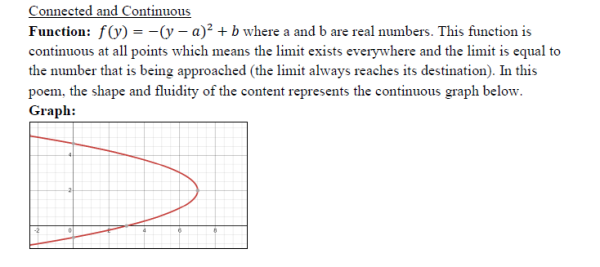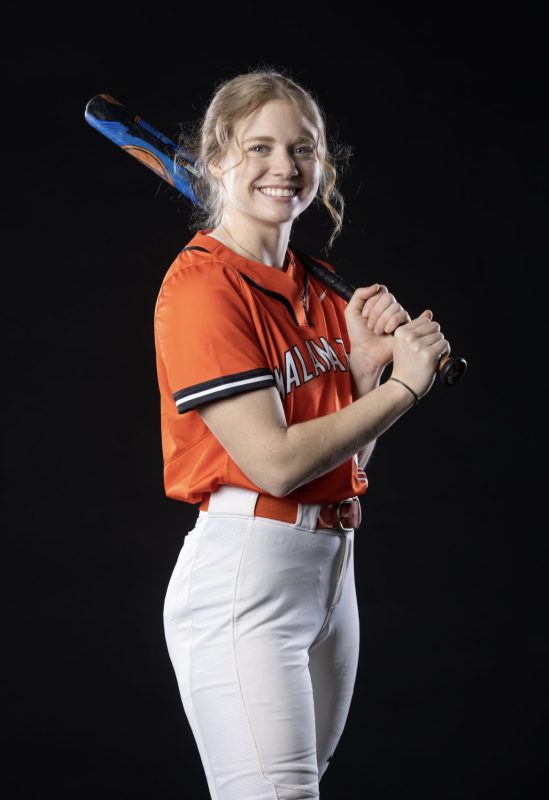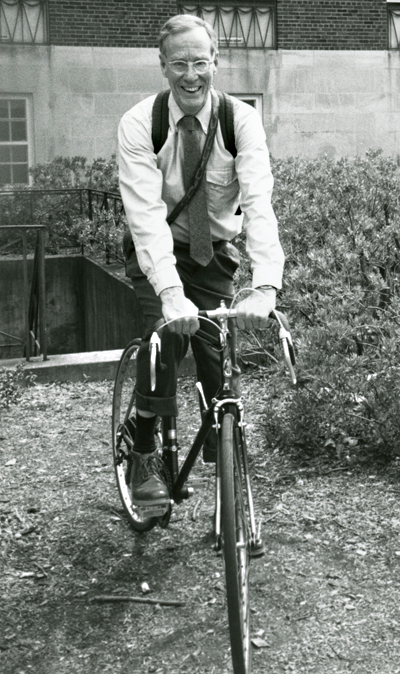A liberal arts education from Kalamazoo College gives students a chance to expand their academic interests with great opportunities to turn hobbies into academic involvement. A great instance of that practice is Lizzy Rottenberk ’24, who is double majoring in mathematics and English with a focus on poetry.
In high school, Rottenberk was sure that mathematics was her main academic focus, while she considered poetry to be her hobby. That changed after she took classes through the English department at the end of her first year at K.
“Personally, writing poems has always represented a good way to self-reflect,” Rottenberk said. “It’s a passion that allows me to see how I am feeling and learn more about myself.”
In fact, for her Senior Integrated Project (SIP), she is merging her two passions of math and poetry. Together, they form “Academic Tangents,” where Rottenberk integrates calculus theorems with poetry structures and contexts. The project consists of reflective poems related to academic struggles with five different math concepts represented: functions, limits, derivatives, sequences and series, and anti-derivatives.
All those collections of poems start with a definition of the theorems, followed by a free-verse poem that redefines the theorem in a poetic way. Finally, Rottenberk incorporates poems representing the theorem in the structure and context. The following is an excerpt from a poem titled Connected and Continuous in her SIP:
Editor’s note: This story was written by Blagoja Naskovski ’24. He serves as a social media ambassador for the College Marketing and Communications team.


“Connected and Continuous” by Elizabeth Rottenberk
6:00 am
eyes widen
brain begins animation
embarking towards the serene kitchen
breakfast smells of sweet warmth and motivation
pecan almond syrup comforting slightly chewy waffles
leading to a freshly organized backpack filled with unlearned trig
to be explored when the sun peaks above tree lines through a wired window
the window that holds foreheads until listening and comprehension become equal
wielding a pencil like the sword of King Arthur as he is who you traveled to learn about
through the roughest of puddles, more ferocious of red lights but nevertheless, you arrived
to hear the educators chant the literary devices and warn us about math’s greatest complexities
and experience numerous “ah ha’s” that fuel flights into deeper TOK and AOK conversations
until exit from the essential castle known as the education system has been granted
headed home your mind becomes lured into a rooted nap as it shifts to autopilot
the time for learning discontinues as the sun hides behind the tree line
walking under the threshold to the kitchen where delicious
satisfying-smelling food needs your dining
fuel in the vessel that travels distances
to calculate and conquer problems
and write essays in MLA
eyes closed
6:00 am
Rottenberk is active not only in academics, but also in many on-campus and off-campus initiatives. She currently works as a consultant at the Math and Physics Center, where she provides academic peer support to K students for advanced math classes. Moreover, she is the captain for the softball team and president of the Hacky Sack student organization. She is also a First-Year Experience mentor, which allows her to guide students while they adapt to new academic environments.
Off-campus, Rottenberk is part of Sustainable Living Guide, an organization that provides educational support and resources for healthy and sustainable living. Her commitment to this organization includes organizing virtual classes for sustainability, writing for social media and a website, and conducting research on climate action, zero-waste lifestyle and other topics.
“Being proactive makes me feel better and more productive,” Rottenberk said. “While participating in many on-campus initiatives, I feel that that I am not only contributing to my personal and professional growth, but also to my community.”
Rottenberk said K’s liberal arts education has empowered her to push her boundaries while allowing her to apply creative thinking in her academics. Two of her most influential classes at K have been ENG210: Intermediate Poetry Workshop, where she expanded her knowledge of how to write poems, and MATH320: Real Analysis.
“I would encourage students to be independent with established critical thought,” she said. “More importantly, I strongly suggest students utilize every opportunity that K classes offer when it comes to critical thinking.”










 Writer in Residence Diane Seuss has published a poem, “backyard song,” in the February issue of Poetry Magazine. Di’s poem is part of a group of a recently devised poetic form known as the Golden Shovel, an homage to the poet Gwendolyn Brooks, who would be 100 years old this year. The last words of each line in a Golden Shovel poem are, in order, words from a line or lines taken often, but no invariably, from a Brooks poem.
Writer in Residence Diane Seuss has published a poem, “backyard song,” in the February issue of Poetry Magazine. Di’s poem is part of a group of a recently devised poetic form known as the Golden Shovel, an homage to the poet Gwendolyn Brooks, who would be 100 years old this year. The last words of each line in a Golden Shovel poem are, in order, words from a line or lines taken often, but no invariably, from a Brooks poem. In a speech he gave in 1987, Professor Emeritus of English Conrad Hilberry said, “When I think of poems that I am especially drawn to, I find they often have a silence, a mystery at the center.”
In a speech he gave in 1987, Professor Emeritus of English Conrad Hilberry said, “When I think of poems that I am especially drawn to, I find they often have a silence, a mystery at the center.”
 Betty Rita Gómez Lance, professor emeritus of Romance languages and literatures, died on September 18, 2016. She was 93. Her career at Kalamazoo College spanned 27 years (1961-1988). Before coming to K she taught at Washington University in St. Louis and at the University of Illinois.
Betty Rita Gómez Lance, professor emeritus of Romance languages and literatures, died on September 18, 2016. She was 93. Her career at Kalamazoo College spanned 27 years (1961-1988). Before coming to K she taught at Washington University in St. Louis and at the University of Illinois. Kalamazoo College announced today that Writer in Residence and Assistant Professor of English Diane Seuss ’78 will receive the 2017 Florence J. Lucasse Fellowship for Excellence in Scholarship. It is the highest award bestowed by the Kalamazoo College faculty, and it honors the recipient’s contributions in creative work, research and publication. Seuss is the 28th person in the College’s history to receive the award.
Kalamazoo College announced today that Writer in Residence and Assistant Professor of English Diane Seuss ’78 will receive the 2017 Florence J. Lucasse Fellowship for Excellence in Scholarship. It is the highest award bestowed by the Kalamazoo College faculty, and it honors the recipient’s contributions in creative work, research and publication. Seuss is the 28th person in the College’s history to receive the award.